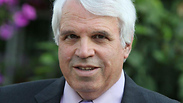
Ahmad Tibi, Tamar Zandberg and Ayman Odeh

Dr. Alon Liel
In Israeli politics there are currently three ideologies: the national-religious right (that some some might say is messianic); the conservative-capitalist center, and the left, which strives for a two-state solution and equality between Jews and Arabs within Israel's borders. There is a big gap between the three ideologies and there are certainly no swing voters mulling which way to go. In fact, swing voters would probably get stuck in the comfort of the ever-growing political center if they were to actually swing.
When it comes to their political agendas, there is no blurring of lines, everything is delineated, clearly and simply. The right seeks to tighten the grip on the occupation and preserve the contentious Nation-State Law; the center wants to amend the Nation-State Law but continue the occupation on a lesser scale, and the left seeks to end the occupation and abolish the Nation-State Law altogether.
The left is undoubtedly the smallest of the three camps, with only every tenth citizen among Israeli Jews identifying with the ideology. Among the Arab population, however, the numbers are much greater. The Jewish left cannot be resurrected without the help of Israeli Arabs and the Israeli Arabs don’t have political legitimacy without the Jewish left. This is not just a convenient political marriage without which both groups would find themselves irrelevant in Israeli politics. There is a common ideological denominator in this marriage that faciliates this mutual embrace, which in turn strengthens the Israeli left-wing.
Currently, there are two parties that define the Israeli left: the Joint List (even in light of MK Ahmad Tibi’s decision to split from it) and Meretz. Neither plays an important role in the decision-making process and neither impacts on the country's strategic direction. There is also no chance that they would unite or even cooperate on issues important to them. However, both of them will soon have a more defined Jewish-Arab character as parties, thereby strengthening the Jewish-Arab cooperation in the left-wing bloc.
As someone who identifies as left-wing, and who would never swing in any other direction, I will not vote for a party on the left that does not have both Arab and Jewish representatives in realistic spots. Only if Meretz and the Joint List create a real Jewish-Arab political partnership will the left-wing camp be able to work productively toward ending the occupation and amending the Nation-State Law — which is a disgrace to Jews as a whole and not only to the State of Israel.
Jewish communities abroad, especially in the United States and the United Kingdom (nearly half of the world’s entire Jewish population) have understood the importance of creating a joint Jewish-Arab society in Israel.
An analysis of Jewish contributions to Israel indicates that world Jewry continued to increase in those places where the belief in the Jewish-Arab cooperation appear to be the strongest. The support of the American-British Jewish Diaspora for this political trend is also capable of strengthening the Jewish-Arab-liberal-democratic-peace-loving camp.

















